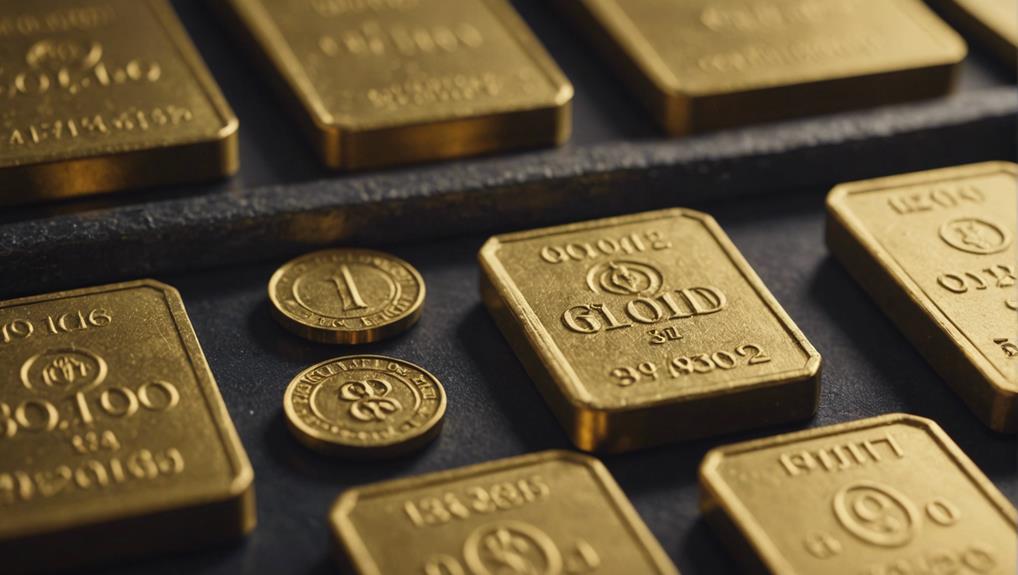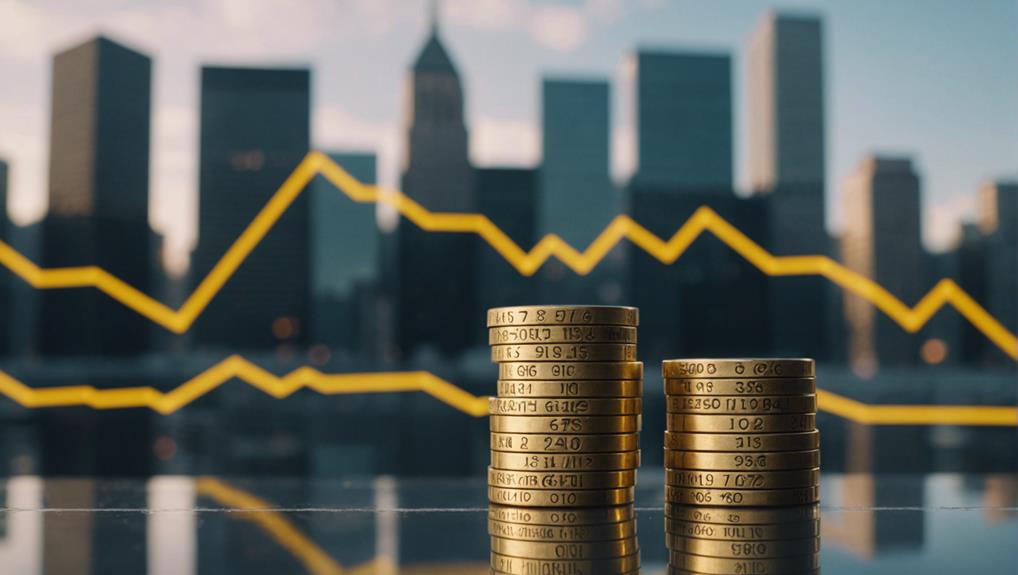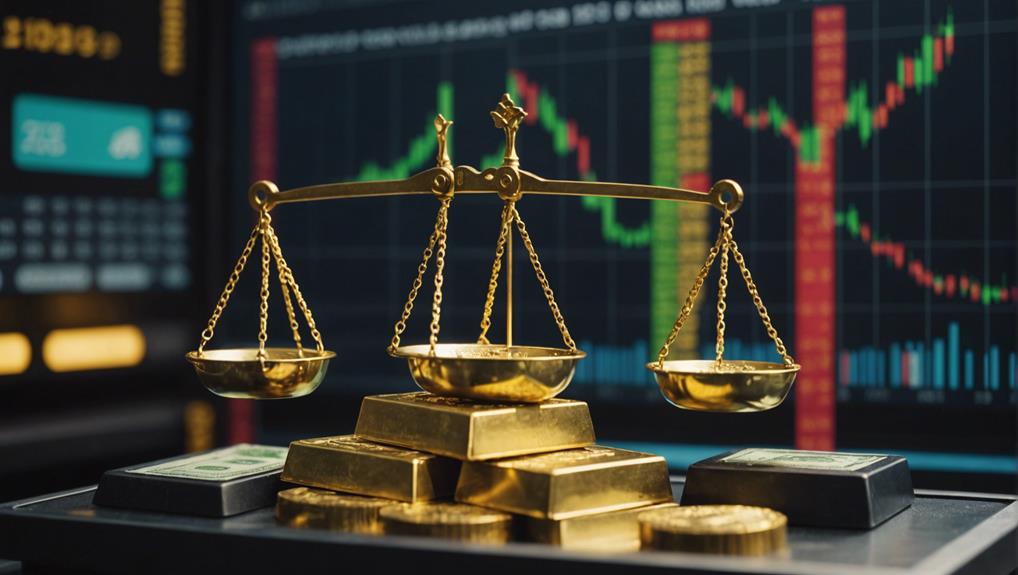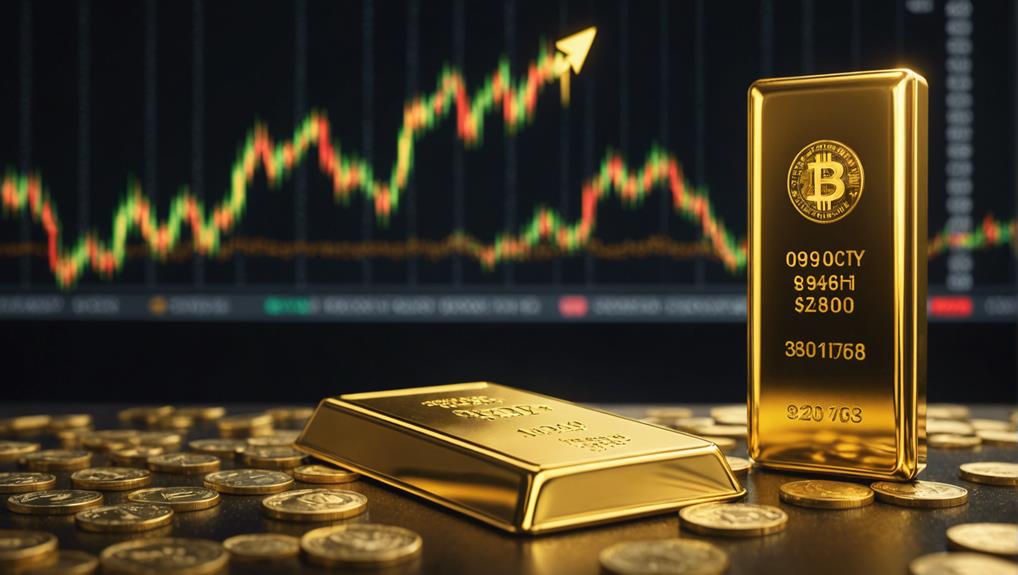Quantitative easing (QE) involves central banks buying long-term securities to inject money into the economy, aiming to lower interest rates and spur economic activity. This increase in liquidity can lead to inflation, where the value of currency decreases and prices for goods and services rise. Historically, during such times, gold has been a preferred asset because it's seen as a stable store of value that can hedge against inflation. During periods of QE, gold prices typically rise due to its perceived safety and the lower interest rates, making it an attractive investment. As you consider the nuances between QE and gold's performance, deeper insights into strategic asset management are uncovered.
Understanding Quantitative Easing

Quantitative easing, often referred to as 'QE,' involves a central bank purchasing long-term securities to inject money directly into the economy. This action aims to lower interest rates and increase liquidity, which can encourage borrowing and investing.
You'll see central banks like the Federal Reserve stepping in during times of economic slowdown to stimulate financial activity. By purchasing these securities, the central bank adds new money to the system, ideally leading to economic growth.
However, it's essential for you to understand that while QE can reduce the risk of deflation, it may lead to higher inflation if not executed carefully. This balancing act is crucial for maintaining economic stability without overheating the market.
Historical Perspective on Gold

Throughout history, gold has been revered as a stable source of value and a reliable hedge against inflation. You've likely heard tales of ancient empires where gold not only adorned the elite but also bolstered economic stability. From the Roman Empire to modern times, gold has consistently played this pivotal role.
It's not merely about luxury; it's a cornerstone for financial systems. When you look at the gold standard, which many countries followed until the 20th century, you see a direct tie between gold and the stability of currency values. Even today, central banks hold significant reserves of gold, underscoring its ongoing trust and value as a protective asset against economic uncertainties and currency devaluation.
QE's Effect on Inflation Rates

While gold has long been a stable investment, the introduction of Quantitative Easing (QE) has significantly influenced inflation rates in recent times. You've seen central banks, like the Federal Reserve, inject vast sums of money into the economy, aiming to stimulate growth by purchasing assets. This flood of liquidity was intended to prop up economies during downturns, such as the 2008 financial crisis and the recent COVID-19 pandemic.
However, this increase in money supply can lead to inflationary pressures. When more money chases the same amount of goods and services, prices generally rise. You've noticed that while QE can temporarily enhance economic activity, it also poses the risk of escalating living costs, affecting your purchasing power.
Gold's Performance During QE Periods

During periods of Quantitative Easing, you've seen gold's value typically rise as investors seek a reliable inflation hedge. This consistent appreciation stems from gold's perception as a safe asset when future economic stability is uncertain. Typically, as central banks increase the money supply, the value of currency might drop, making gold an attractive alternative.
You've observed that during these times, the demand for gold increases, not merely among individual investors but also among central banks and institutional investors. This heightened demand helps to push prices up. Moreover, as interest rates are generally lower during periods of QE, the opportunity cost of holding gold decreases, which further supports higher prices. Consequently, gold often outperforms other non-yielding assets in such conditions.
Comparing Gold With Other Assets

Now, let's compare gold with other assets like equities and real estate.
You'll see that while stocks may offer high returns, they come with greater volatility compared to gold.
On the other hand, real estate provides tangible asset benefits but doesn't have the same liquidity as gold, making it harder to sell quickly.
Gold Vs. Equities Performance
Historically, gold often outperforms equities during periods of high inflation and economic uncertainty. When you're contemplating where to park your investments, you might view gold as a solid choice, particularly when the market seems volatile. Unlike stocks, which can be highly sensitive to company performances and market sentiments, gold isn't tied to specific corporate earnings. It's seen as a store of value that retains its worth, and this characteristic often makes it a safer bet during tough times.
On the other hand, equities generally offer higher returns over the long run, assuming you're willing to accept higher risk. It's all about balance. You'd want to mix assets to protect and grow your portfolio, taking into account gold's stability against equities' potential.
Real Estate and Gold
Shifting focus to another asset class, let's compare the benefits of investing in real estate versus gold. Real estate often offers the allure of tangible assets, potentially steady rental income, and tax advantages. Gold, on the other hand, is celebrated for its liquidity and historical role as a safe haven during economic turmoil.
Here's why emotions might swing between these choices:
- Security: Real estate feels more substantial; you can touch it, see it, renovate it. It's a physical place to call home or generate income.
- Stability: Gold can be a calming presence in your portfolio, especially when currency values fluctuate wildly.
- Legacy: Owning property can evoke a sense of pride and continuity, passing tangible assets to future generations.
Investor Sentiment on Gold

You might be wondering how investors currently feel about gold, particularly given its reputation as a safe haven during economic turbulence. Observations suggest that market trends in gold often reflect broader economic sentiments, swaying between optimism and caution.
Understanding these dynamics can help you better gauge when to consider gold as part of your investment portfolio.
Gold's Safe Haven Status
Investors often turn to gold as a safe haven during times of economic uncertainty. You might feel drawn to its inherent value, which typically doesn't depreciate even in volatile markets. Here's why gold often seems like a comforting choice:
- Security: Gold has a history of retaining value when other assets falter, providing a cushion against financial market shocks.
- Tangibility: Unlike digital assets or stocks, gold is a physical commodity you can hold, offering a psychological sense of stability.
- Universality: Gold is globally recognized and accepted, enhancing its appeal during international economic tensions.
You're not simply investing in any asset; you're turning to a time-tested refuge that has weathered countless financial storms.
Market Trends in Gold
Recently, market trends have shown a significant rise in gold investments as you and other investors seek stability amid global economic fluctuations. This shift reflects a growing preference for what's perceived as a safer asset during times of uncertainty.
| Year | % Increase in Gold Investment | Primary Drivers |
|---|---|---|
| 2020 | 22% | Economic Uncertainty |
| 2021 | 18% | Inflation Fears |
| 2022 | 15% | Currency Devaluation |
| 2023 | 20% | Political Instability |
You're likely noticing that economic and political factors play a huge role in influencing gold prices and investment volumes. As central banks continue with varying policies, the appeal of gold as a hedge against inflation and economic instability remains strong, keeping you and fellow investors keenly interested in its market dynamics.
Future Outlook for Gold Investments

Many experts believe that gold will continue to be a valuable asset in the face of ongoing economic uncertainties. As you look ahead, consider how gold might fit into your investment strategy:
- Diversification: Adding gold to your portfolio can reduce risk and volatility. It often moves independently of stocks and bonds, providing a safety net during market downturns.
- Inflation Hedge: Historically, gold has maintained its value over the long term, serving as a strong hedge against inflation and the erosion of major currencies.
- Global Demand: Increasing demand in emerging markets, particularly for jewelry and electronics, could further drive gold prices up, offering potential gains for your investments.
Stay informed and proactive as you explore these possibilities.
Policy Changes and Market Implications

Policy changes in the central banks' approach to quantitative easing could significantly impact your gold investment strategy.
When central banks increase money supply, you might expect inflation, making gold more attractive as it historically holds value.
Nonetheless, if they tighten policies and reduce liquidity, interest rates could rise. This scenario often leads to a stronger currency but weaker gold prices since gold doesn't yield interest.
You'll need to stay informed about central bank announcements and global economic indicators. It's essential you understand how shifts in policy can indirectly affect gold's allure as an inflation hedge.
Always assess how these changes align with your long-term investment goals before making any moves in your portfolio.
Conclusion
In this modern economic landscape, quantitative easing (QE) has become a common but dubious practice where central banks seem to create money without restraint. Amidst this financial wizardry, gold remains a steadfast protector against inflation. Despite the buzz around newer investments like cryptocurrencies and stocks, gold continues to be a reliable safeguard.
The ongoing reliance on QE raises questions about the stability and transparency of our monetary systems, often manipulated by those in power for the benefit of the wealthy, leaving everyday investors at a disadvantage. This dynamic only deepens my distrust for the banking system and politicians who often seem more interested in their agendas than in economic fairness.
Gold, unswayed by the whims of policymakers, offers a sense of control over one's investment that's hard to match in the current financial climate dominated by opaque banking practices. Its enduring value in times of economic uncertainty illustrates why returning to gold can be a wise decision.
If you're tired of feeling like a bystander in the unpredictable theater of modern finance, consider taking control of your financial future. Request your free gold information kit today from the Gold Information Network and start making informed decisions that align with your need for stability and transparency.
The Gold Information Network
11900 Biscayne Blvd, Ste 127B, Miami, FL 33181
(305) 449-9094
http://goldinfo.net







